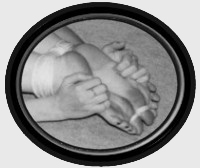$Tickletorturer
TMF Expert
- Joined
- Apr 11, 2002
- Messages
- 496
- Points
- 0
I'm doing a search on history and tickling so I'll probably have several posts on this. Here's my first find on the study of laughter:
Tickling is the most reliable stimulus for laughter. The neurological basis for the response to tickling probably evolved from a reflex defense mechanism that protected our body's surface from external, moving stimuli--most often, predators or parasites. The original reflex actions may have ranged from brushing away an invader to ever more energetic attempts to break free. The response to tickling is still somewhat like a reflex (we laugh uncontrollably when tickled, struggle to escape the tickler, push away the tickling hand). Beyond that, however, tickling is yet another social context for laughter. One of our surveys indicated that people tickle and are tickled by friends, family, and lovers and that the rationale given most often for tickling someone is to show affection. Our nervous system conspires to enforce this sociality of tickling: we can't tickle ourselves.
Tickle battles, the most benign form of human conflict, bind us together in a laugh-filled give-and-take. The ticklee may push away the tickler's hand and, if necessary, run away, only to return and renew the interaction. For infants who can't yet talk, tickling, along with the associated laughter, is an entree into social relationships. Laughter signals "I like it; do it again!" while crying and fending off the other person signal that the game has gone too far. Tickling games, we found in surveys, are not confined to children. In adults, such tactile friskiness is commonly part of sex play. Tickling is also the source of what may be the most ancient joke, the feigned tickle of the "I'm going to get you" game, a ruse that works even with our hairy cousins the chimpanzees.
Chimpanzees (and other great apes) also produce a laughlike sound when tickled or during play, a fact noted by Charles Darwin in The Expression of the Emotions in Man and Animals (1872). But in important details, chimp laughter differs from that of humans. Laughing humans chop an outward breath into a series of short (1/15 second), vowel-like blasts ("ha," "ho," or "he") that repeat about every 1/5 second, with a decrescendo as the lungs run out of air. The sounds have a marked harmonic structure, consisting of a fundamental frequency and its overtones. Chimpanzee laughter, however, is breathy--lacking the voiced, vowel-like sounds, the harmonic structure, and the clean onset and termination of the human "ha." The chimp utterances are produced at about twice the human rate, with one sound generated during each outward and inward breath.
There's more but it doesn't deal with tickling.
Tickling is the most reliable stimulus for laughter. The neurological basis for the response to tickling probably evolved from a reflex defense mechanism that protected our body's surface from external, moving stimuli--most often, predators or parasites. The original reflex actions may have ranged from brushing away an invader to ever more energetic attempts to break free. The response to tickling is still somewhat like a reflex (we laugh uncontrollably when tickled, struggle to escape the tickler, push away the tickling hand). Beyond that, however, tickling is yet another social context for laughter. One of our surveys indicated that people tickle and are tickled by friends, family, and lovers and that the rationale given most often for tickling someone is to show affection. Our nervous system conspires to enforce this sociality of tickling: we can't tickle ourselves.
Tickle battles, the most benign form of human conflict, bind us together in a laugh-filled give-and-take. The ticklee may push away the tickler's hand and, if necessary, run away, only to return and renew the interaction. For infants who can't yet talk, tickling, along with the associated laughter, is an entree into social relationships. Laughter signals "I like it; do it again!" while crying and fending off the other person signal that the game has gone too far. Tickling games, we found in surveys, are not confined to children. In adults, such tactile friskiness is commonly part of sex play. Tickling is also the source of what may be the most ancient joke, the feigned tickle of the "I'm going to get you" game, a ruse that works even with our hairy cousins the chimpanzees.
Chimpanzees (and other great apes) also produce a laughlike sound when tickled or during play, a fact noted by Charles Darwin in The Expression of the Emotions in Man and Animals (1872). But in important details, chimp laughter differs from that of humans. Laughing humans chop an outward breath into a series of short (1/15 second), vowel-like blasts ("ha," "ho," or "he") that repeat about every 1/5 second, with a decrescendo as the lungs run out of air. The sounds have a marked harmonic structure, consisting of a fundamental frequency and its overtones. Chimpanzee laughter, however, is breathy--lacking the voiced, vowel-like sounds, the harmonic structure, and the clean onset and termination of the human "ha." The chimp utterances are produced at about twice the human rate, with one sound generated during each outward and inward breath.
There's more but it doesn't deal with tickling.













